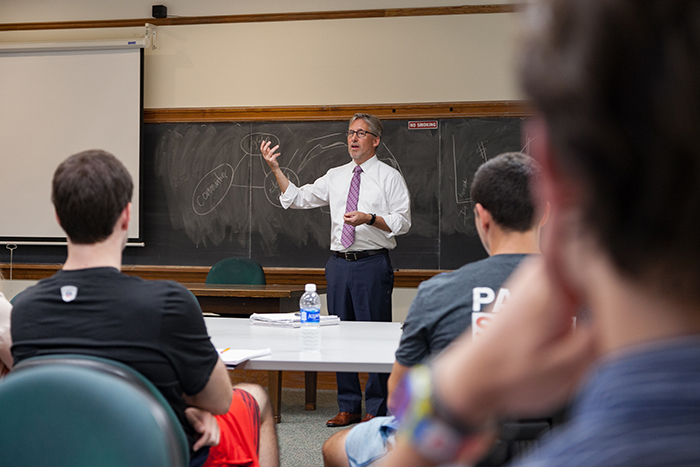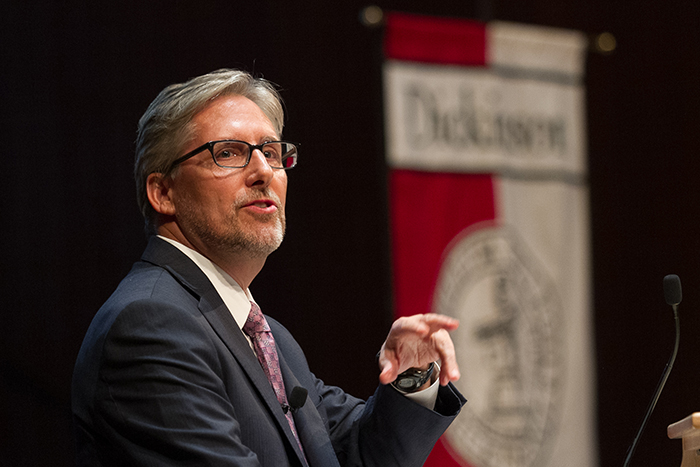Change Your Behavior, Change Your World

Brett Jenks, recipient of the 2017 Rose-Walters Prize for Global Environmental Activism, works with students in Professor of Political Science Jim Hoefler's senior seminar. Photo by Carl Socolow '77.
Jenks: To fight climate change, look within
by MaryAlice Bitts-Jackson
“There are literally a billion opportunities to reduce greenhouse gases every day,” said environmental leader/activist Brett Jenks during the recent Rose-Walters Prize lecture in the Anita Tuvin Schlechter Auditorium, “because each one of us represents one of those opportunities.” The challenge: getting every one of those individuals to behave sustainably, day to day.
As the CEO and president of Rare, a nonprofit that seeks to use behavioral science techniques to help solve global problems, Jenks is on the case. And during a weeklong residency at Dickinson, he announced the launch of a new educational center that will help train others to join in that good fight.
Jenks is the 2017 recipient of the Rose-Walters Prize for Global Environmental Activism, which brings change-makers to campus to share cutting-edge research and work (past recipients are science writer Elizabeth Kolbert, actor-activist Mark Ruffalo, former EPA director Lisa Jackson, documentarian-activist James Balog and activist, author and journalist Bill McKibben). Jenks is earmarking the $100,000 prize money to launch the Center for Behavior & the Environment, a first-of-its-kind program with a five-year goal to train 2,500 conservation leaders to change unsustainable behaviors by altering the way we think about our environment, our world and ourselves.
“Humans have an incredible opportunity to adapt and evolve, and the same minds that created climate change will be able to put an end to it,” Jenks said. “It’s about meeting people where they are, respecting them and helping them make changes in their own way to benefit themselves.”

Brett Jenks delivers a Tuesday evening public address in the Anita Tuvin Schlechter Auditorium. Photo by Carl Socolow '77.
The center's first project is a workshop at Dickinson through which more than 25 students and faculty and staff members will learn about the core principles of Rare’s behavioral design approach and will learn to apply what they’ve learned to a sustainability challenge on campus. It’s part of an eventful weeklong residency that also includes a public lecture, four classroom visits, breakfasts with Center for Sustainability Education interns and Treehouse residents, a sustainability career and internship discussion at the Career Center, a student-leader roundtable and a tour of the College Farm, where food waste reduction programs, silvopasture and other sustainable initiatives are well underway.
Rachel Krewson ’20 (physics, environmental science), an ALLARM lab coordinator, attended Jenks’ lecture and met with him as part of a small group of student leaders. She also will attend the Thursday morning pilot workshop. She said that residencies like these are helpful, because they help students find new ways to approach complex problems, such as the relationship between humanity and the environment.
“If we continue to learn more about these complex relationships,” she said, “we can make more educated decisions and search for better solutions to environmental crises in our world.”
“I have a lot of hope,” Jenks said, addressing an audience of Dickinsonians and community members during his lecture. “And we look forward to working together with Dickinson professors, alumni and current students to work on this challenge.”
TAKE THE NEXT STEPS
Published October 11, 2017